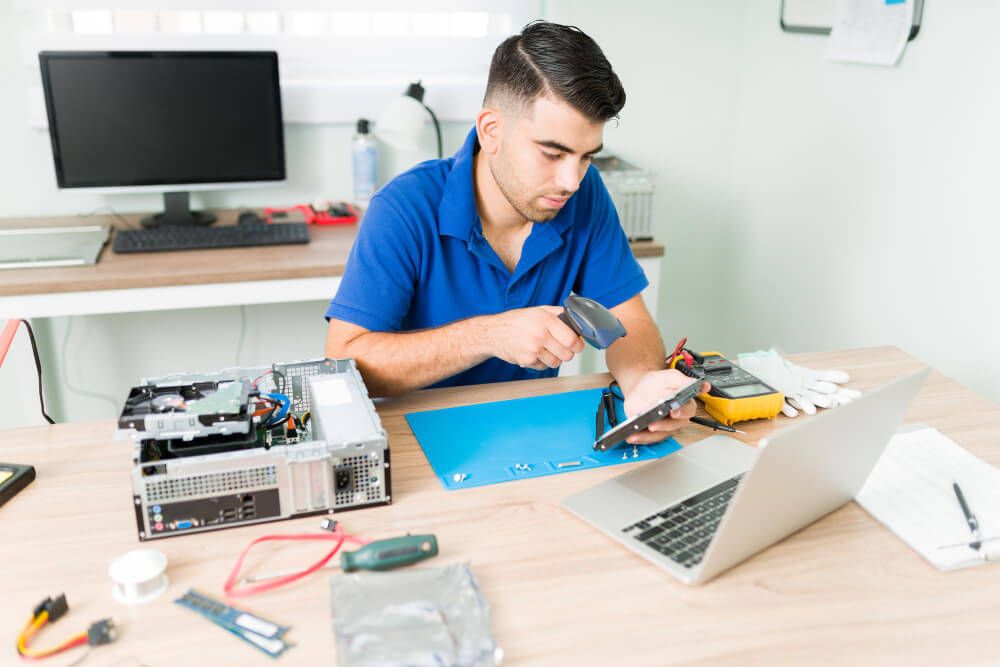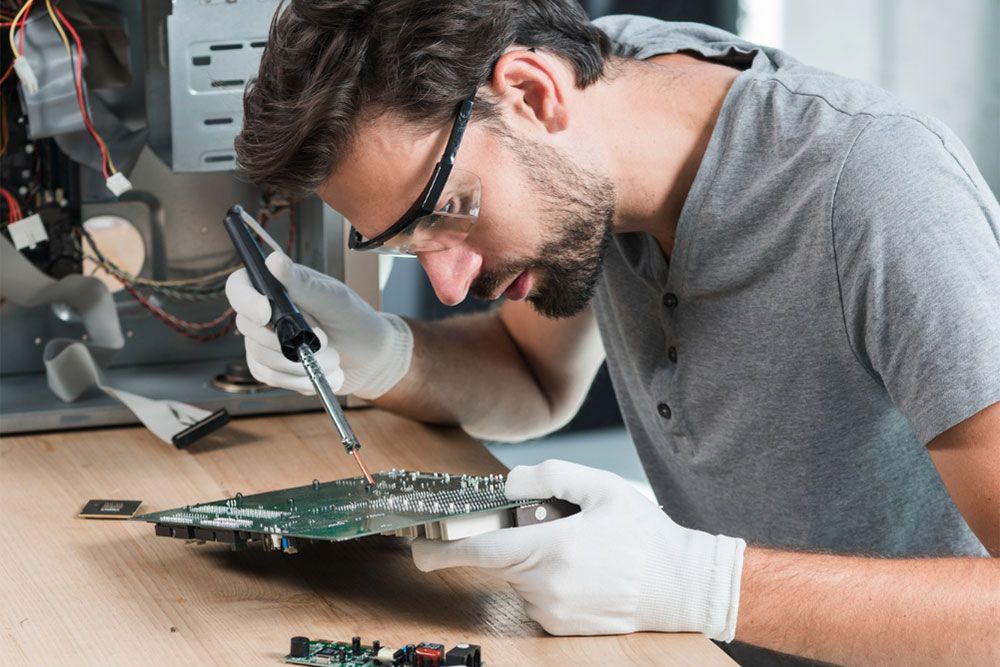DIY Computer Repair: Essential Dos and Don’ts | Geeks2You


In today’s digital age, encountering computer issues is almost inevitable. Whether it’s a sluggish performance, software glitches, or hardware malfunctions, knowing how to address these problems can save you time and money. DIY computer repair can be a cost-effective solution, but it’s essential to approach it with caution. In this guide, we’ll explore the dos and don’ts of DIY computer repair to help you navigate troubleshooting effectively.
Table of Contents
ToggleUnderstanding the Dos of DIY Computer Repair
When it comes to DIY computer repair, certain practices can help you effectively troubleshoot and resolve common issues. Here are some essential dos to keep in mind:
- Backup Your Data: Before attempting any repairs, always back up your important data to prevent loss in case of unforeseen complications. Use external hard drives, cloud storage, or backup software to create secure backups of your files and documents.
- Research Thoroughly: Take the time to research the specific issue you’re experiencing and familiarize yourself with potential solutions. Online forums, tech blogs, and tutorials can provide valuable insights and step-by-step guides for troubleshooting.
- Use the Right Tools: Ensure you have the necessary tools and equipment for the repair task at hand. Basic tools like screwdrivers, anti-static wristbands, and thermal paste applicators are essential for hardware repairs, while software troubleshooting may require diagnostic software and recovery tools.
- Follow Proper Safety Precautions: When working with computer hardware, always prioritize safety to avoid accidents or damage to components. Disconnect the power source, ground yourself to discharge static electricity, and handle delicate parts with care to prevent damage.
- Document Your Process: Keep track of the steps you take during the repair process, including any changes or adjustments made to the system. Documentation can help you retrace your steps if needed and provide valuable information for future reference.
Avoid These Common Don’ts of DIY Computer Repair
While DIY computer repair can be empowering, certain practices can do more harm than good if not approached correctly. Here are some common don’ts to avoid:
Ignoring Safety Guidelines
Neglecting safety precautions when working with computer hardware can result in severe consequences, including damage to components or personal injury. Always follow safety guidelines and best practices to minimize risks. Ensure that you:
-
- Wear anti-static wristbands to discharge static electricity and prevent damage to sensitive components.
-
- Disconnect the power source and remove batteries from laptops before attempting any repairs to avoid electrical shocks.
-
- Use proper tools and equipment, such as screwdrivers and pliers, designed for computer repair to prevent accidents and injuries.
-
- Work in a well-ventilated area to prevent the buildup of heat and minimize exposure to potentially harmful fumes from soldering or cleaning solutions.
Rushing the Process
Patience is crucial when it comes to DIY computer repair. Rushing through troubleshooting or attempting quick fixes without thorough investigation can lead to incomplete repairs or further damage to the system. Take the time to:
-
- Carefully diagnose the problem by observing symptoms, running diagnostic tests, and researching potential causes before attempting any repairs.
-
- Follow step-by-step guides or tutorials carefully, ensuring that each step is completed accurately and thoroughly.
-
- Test the system after each repair or adjustment to verify that the issue has been resolved before moving on to the next step.
-
- Document your progress and any changes made to the system to facilitate troubleshooting and future reference.
Disregarding Warranty Coverage
If your computer is still under warranty, attempting DIY repairs may void the warranty and leave you liable for repair costs. Before embarking on any repair projects, check your warranty coverage and terms to determine what repairs are covered and whether DIY attempts are allowed. Consider the following:
-
- Review the warranty documentation provided by the manufacturer or retailer to understand its terms and limitations regarding repairs and modifications.
-
- Contact the manufacturer or authorized service provider to inquire about warranty coverage and seek guidance on the appropriate course of action for resolving the issue.
-
- Consider the potential consequences of voiding the warranty, including the cost of repairs and the risk of further damage to the system.
Overlooking Professional Help
While DIY repair can be effective for minor issues, complex problems may require professional expertise. Don’t hesitate to seek help from experienced technicians if you’re unsure about the repair process or if the issue persists. Consider the following:
-
- Consult reputable online resources, forums, or communities for advice and troubleshooting tips from experts and experienced users.
-
- Contact professional computer repair services, such as Geeks2You, for assistance with diagnosing and resolving complex issues that exceed your skill level or available resources.
-
- Be honest with yourself about your abilities and limitations when it comes to DIY repair. If you’re unsure about a repair task or lack the necessary tools or expertise, it’s better to seek professional help than risk causing further damage to your computer.
Experimenting with Advanced Repairs
Some repairs, such as soldering components or replacing intricate parts, require specialized skills and equipment. Attempting advanced repairs beyond your expertise can lead to irreparable damage to your computer. Avoid the following:
-
- Performing invasive procedures, such as soldering or desoldering components, without proper training and experience.
-
- Disassembling complex components, such as motherboards or graphics cards, without understanding their internal workings and potential risks.
-
- Modifying or overclocking hardware components without thorough research and understanding of the potential consequences for system stability and reliability.
-
- Underestimating the complexity of advanced repair tasks and the potential for costly mistakes or irreversible damage to your computer.
Geeks2You: Your Trusted Partner in Computer Repair
At Geeks2You, we understand the challenges of DIY computer repair and are here to help when you need professional assistance. Our team of experienced technicians offers reliable computer repair services tailored to your needs, ensuring prompt and effective solutions for all your tech-related issues. From home office network set up to fixing something that simply isn’t working correctly, Geeks 2 You can help.
Whether you’re facing hardware failures, software glitches, or performance issues, Geeks2You has the expertise and resources to get your computer back on track. Don’t let computer problems slow you down – contact Geeks2You today for expert repair services you can trust.

Instant Quote
Get A FREE Quote IMMEDIATELY
Other Blogs You May Be Interested In
Categories
Satisfaction Guaranteed
Computer Repair You Can Trust
Experimenting with Advanced Repairs
Some repairs, such as soldering components or replacing intricate parts, require specialized skills and equipment. Attempting advanced repairs beyond your expertise can lead to irreparable damage to your computer. Avoid the following:
-
- Performing invasive procedures, such as soldering or desoldering components, without proper training and experience.
-
- Disassembling complex components, such as motherboards or graphics cards, without understanding their internal workings and potential risks.
-
- Modifying or overclocking hardware components without thorough research and understanding of the potential consequences for system stability and reliability.
-
- Underestimating the complexity of advanced repair tasks and the potential for costly mistakes or irreversible damage to your computer.
Geeks2You: Your Trusted Partner in Computer Repair
At Geeks2You, we understand the challenges of DIY computer repair and are here to help when you need professional assistance. Our team of experienced technicians offers reliable computer repair services tailored to your needs, ensuring prompt and effective solutions for all your tech-related issues. From home office network set up to fixing something that simply isn’t working correctly, Geeks 2 You can help.
Whether you’re facing hardware failures, software glitches, or performance issues, Geeks2You has the expertise and resources to get your computer back on track. Don’t let computer problems slow you down – contact Geeks2You today for expert repair services you can trust.












